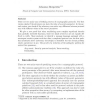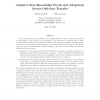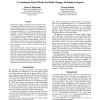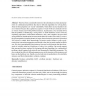6 search results - page 1 / 2 » Static Equivalence is Harder than Knowledge |
98
Voted
ENTCS
2006
15 years 1 months ago
2006
There are two main ways of defining secrecy of cryptographic protocols. The first version checks if the adversary can learn the value of a secret parameter. In the second version,...
KI
2002
Springer
15 years 24 days ago
2002
Springer
This contribution reports on ongoing collaborative research at the University of Stanford, Department of Psychology, and the University of Hamburg, Department for Informatics. Ext...
112
Voted
TCC
2009
Springer
16 years 1 months ago
2009
Springer
In the setting of secure computation, a set of parties wish to securely compute some function of their inputs, in the presence of an adversary. The adversary in question may be st...
113
click to vote
AAAI
2000
15 years 2 months ago
2000
We present a general, consistency-based framework for belief change. Informally, in revising K by , we begin with and incorporate as much of K as consistently possible. Formally, ...
108
Voted
CP
2007
Springer
15 years 7 months ago
2007
Springer
Abstract There has been considerable interest in the identification of structural properties of combinatorial problems that lead to efficient algorithms for solving them. Some of...




